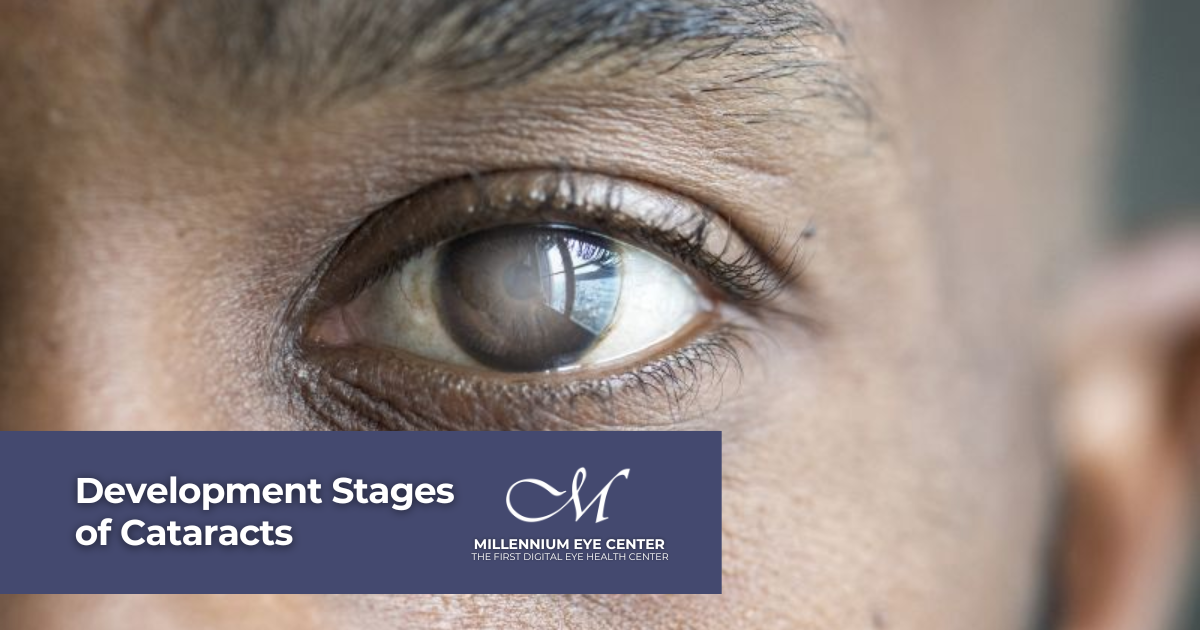As we age, many changes occur in our bodies, and our eyes are no exception. One common age-related condition is cataracts, a clouding of the eye’s natural lens that can significantly impact vision.
At Millennium Eye Center, we believe in an integrative approach to eye care, empowering you with knowledge to protect your sight. Understanding the stages of cataract development is crucial for proactive management.
What is a Cataract?
Simply put, a cataract is a cloudy area in the lens of your eye, which is normally clear. Think of it like looking through a foggy or frosted window. This clouding scatters light entering the eye, leading to blurred vision.
The Stages of Cataract Development:
-
Incipient Cataract (Early Stage)
In its earliest phase, a cataract is minor. You might experience small, isolated cloudy areas in the lens, often in the periphery. Vision is usually minimally affected at this point, but some individuals might notice slight glare sensitivity at night or a subtle blur. From an integrative perspective, maintaining a diet rich in antioxidants and diligently protecting your eyes from UV rays can potentially help slow progression.
-
Immature Cataract (Moderate Stage)
As the cataract progresses, the cloudiness in the lens becomes more pronounced, affecting a larger area. At this stage, vision impairment becomes more noticeable. Symptoms include increased blurriness, more significant glare, and colors appearing dull or faded. Daily activities like reading or driving, especially at night, become more challenging. Regular monitoring by your eye care professional is essential here.
-
Mature Cataract (Advanced Stage)
When a cataract becomes mature, the lens is extensively clouded or even opaque. This leads to severe vision loss, significantly impacting daily life and independence. At this point, activities like reading, driving, and even recognizing faces become extremely difficult. Vision-correcting surgery is typically recommended at this stage to restore clear sight.
-
Hypermature Cataract (Very Advanced, Untreated)
While less common today due to advanced eye care, a cataract can become hypermature if left untreated for a very long time. In this rare stage, the lens can begin to shrink or swell, potentially leading to inflammation or even secondary glaucoma. This underscores the importance of not delaying treatment once vision is significantly impaired.
Our Integrative Approach to Cataract Management
While cataracts are a natural part of aging, a holistic approach can support your eye health. Maintaining a nutrient-rich diet, protecting your eyes from UV exposure, and managing systemic conditions like diabetes can all play a role. Most importantly, regular, comprehensive eye exams are vital for early detection, monitoring, and discussing timely treatment options with Dr. Lauretta. When your vision is significantly impacted, modern cataract surgery is a highly safe and effective procedure to restore clarity.
Discover more about Cataracts by watching Dr. Lauretta’s video:
At Millennium Eye Center, your vision and comfort are our top priorities. We’re committed to providing you with the knowledge and care you need to see your best. If you have any questions or would like to schedule a consultation, please don’t hesitate to contact us.
Millennium Eye Center is a leading provider of comprehensive eye care in the Orlando area. Our experienced team of optometrists can help you manage your astigmatism and achieve optimal eye health.
Whether the best choice is glasses, contacts, or other treatment, we understand that the optimal vision correction solution is one that’s tailored to each individual patient. To schedule an appointment with our Eye Expert, Dr. Lauretta Justin, click HERE or text us at 407-292-9812.
[BOOK YOUR EYE EXAM HERE]
Thank you for choosing us as your family’s partners in lifelong vision health. We treasure the trust you place in our practice!
Top image used is a License-free image from Pixabay.
Disclaimer: The content on this blog is not intended to be a substitute for professional medical advice, diagnosis, or treatment. Always seek the advice of qualified health providers with questions you may have regarding medical conditions.

